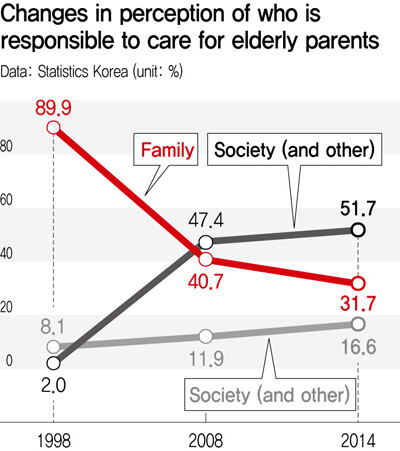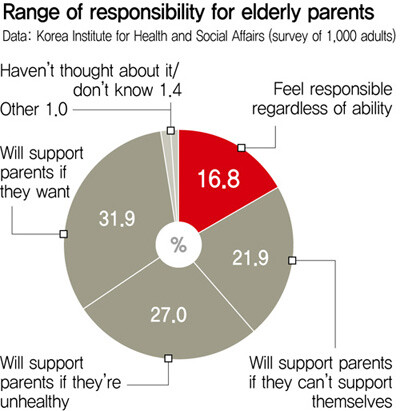hankyoreh
Links to other country sites 다른 나라 사이트 링크
A quarter of elderly people suffer from shame at being in care facilities

One in four seniors admitted to long-term care facilities suffers from “admission trauma,” or a sense of shame over being admitted, a survey shows.
For this and other reasons, nearly four in ten admitted seniors were found to describe their life as “unsatisfactory.”
Ewha Womans University researcher Moon Jeong-hwa published a paper on June 8 titled “Admission Situation Factors and Life Satisfaction among Senior Citizens at Care Facilities.” Its findings, which were based on interviews between Dec. 2014 and Jan. 2015 with 456 seniors at 22 long-term care facilities in Seoul, Gyeonggi Province, and elsewhere in South Korea, showed 24.8% indicating that they were suffering from admission trauma. Another 39% said they felt “no trauma,” while the remainder gave answers of “average” or “near-average.”

The paper defined admission trauma as “feelings of shame and humiliation as a result of admission.”
Respondents were also asked whether their admission was their own idea or the result of pressure from family members, with only 19.5% clearly stating that the decision was voluntary. 60.3% described their admission as totally or nearly involuntary.
Factors such as admission trauma, involuntary admission, and difficulties in the admission process have a negative impact on life satisfaction among admitted seniors even when they are generally satisfied with the facilities and services.
Indeed, a survey on satisfaction with facilities and services found 64.2%, or over six in ten admitted respondents, reporting that they were “satisfied.” Another 29.8%, or 136 seniors, reported “average” satisfaction levels, while just 5.9% said they were dissatisfied.
But only 12.8% described themselves as satisfied with their overall quality of life since admission. Seventeen respondents said they were “wholly unsatisfied,” while another 156 said they were “relatively unsatisfied,” representing a combined 37.9% of the total. “Average” responses were given by 225 seniors, or 49.3%.
“We need carefully designed policy interventions to promote happiness among admitted seniors by offering comprehensive assistance from the pre-admission stages to post-admission life,” Moon suggested.
By Lee Chang-gon, senior staff writer
Please direct questions or comments to [english@hani.co.kr]

Editorial・opinion
![[Column] Park Geun-hye déjà vu in Yoon Suk-yeol [Column] Park Geun-hye déjà vu in Yoon Suk-yeol](https://flexible.img.hani.co.kr/flexible/normal/500/300/imgdb/original/2024/0424/651713945113788.jpg) [Column] Park Geun-hye déjà vu in Yoon Suk-yeol
[Column] Park Geun-hye déjà vu in Yoon Suk-yeol![[Editorial] New weight of N. Korea’s nuclear threats makes dialogue all the more urgent [Editorial] New weight of N. Korea’s nuclear threats makes dialogue all the more urgent](https://flexible.img.hani.co.kr/flexible/normal/500/300/imgdb/original/2024/0424/7317139454662664.jpg) [Editorial] New weight of N. Korea’s nuclear threats makes dialogue all the more urgent
[Editorial] New weight of N. Korea’s nuclear threats makes dialogue all the more urgent- [Guest essay] The real reason Korea’s new right wants to dub Rhee a founding father
- [Column] ‘Choson’: Is it time we start referring to N. Korea in its own terms?
- [Editorial] Japan’s rewriting of history with Korea has gone too far
- [Column] The president’s questionable capacity for dialogue
- [Column] Are chaebol firms just pizza pies for families to divvy up as they please?
- [Column] Has Korea, too, crossed the Rubicon on China?
- [Correspondent’s column] In Japan’s alliance with US, echoes of its past alliances with UK
- [Editorial] Does Yoon think the Korean public is wrong?
Most viewed articles
- 1[Column] Park Geun-hye déjà vu in Yoon Suk-yeol
- 2Will NewJeans end up collateral damage in internal feud at K-pop juggernaut Hybe?
- 3N. Korean hackers breached 10 defense contractors in South for months, police say
- 4Thursday to mark start of resignations by senior doctors amid standoff with government
- 5[Guest essay] The real reason Korea’s new right wants to dub Rhee a founding father
- 6Kim Jong-un expressed ‘satisfaction’ with nuclear counterstrike drill directed at South
- 7Up-and-coming Indonesian group StarBe spills what it learned during K-pop training in Seoul
- 8Why Korea shouldn’t welcome Japan’s newly beefed up defense cooperation with US
- 9Opposition calls Yoon’s chief of staff appointment a ‘slap in the face’
- 10Terry Anderson, AP reporter who informed world of massacre in Gwangju, dies at 76